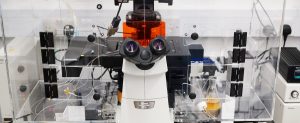Research
The three core research objectives are carried out simultaneously and interlocked:
Computational science: We will pursue advances in BioData analytics and systems level perspectives of BioDesign via complex networks data integration, analysis and modelling. This will be complemented with advances in formal verification techniques and modelling. Our Software engineering experience will inform the process of BioDesign itself and we will seek to implement existing and new standards. Taken together, this approach will lead to a more tractable, scalable as well as trustworthy and economical methodology for innovation in Synthetic Biology.
Key words: Algorithms for complex bio networks, Big Data analytics, Machine Intelligence, BioDesign, Software Engineering
Biological Engineering: Progress in the way a cell is accessed and used by synthetic circuits, which requires new ways to allocate a given biological process to a targeted subcellular space for optimal and non-interfering operation.
Key words: bacterial transcription and translation systems, cell metabolism, cell wall synthesis and replicons biology to engineer living bio-adaptors in multiple biological chassis
Responsible Innovation: A range of ethical, legal and social aspects (ELSA) have been identified within the emergence of SynBio in 2010 and responsible Innovation is also one of the core areas in the UK roadmap for SynBio (RCUK 2012). We will address Responsible Innovation by the Empirical Study of emerging ELSA dynamics and producing Dialogue and deliberation including public engagement activities.
Key words: Society, Bioethics, Responsible (Research and) Innovation, Governance


